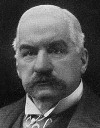Business education is often good at teaching useful business theories and skills, but it is less often good at teaching ethics. Ethics is often seen as irrelevant or as an obstacle, so business ethics is either not included in the core business curriculum or offered as an elective ornament.
Claim: Ethics is organically central to business success, and should be so built into business education. Two quotations from giants of American business in support.
First, from Georges Doriot, one of America’s trailblazing venture capitalists, as quoted in Jeffrey Young’s Forbes Greatest Technology Stories:
 “Doriot spends most of his time talking to people who bring him prospective investments. He says he has considered no less than 5,000 of them since 1946. He is considered by friends and critics alike as a brilliant judge of character. But he has to be, he explains. ‘When someone comes in with an idea that’s never been tried, the only way you can judge is by the kind of man you’re dealing with’” (p. 101).
“Doriot spends most of his time talking to people who bring him prospective investments. He says he has considered no less than 5,000 of them since 1946. He is considered by friends and critics alike as a brilliant judge of character. But he has to be, he explains. ‘When someone comes in with an idea that’s never been tried, the only way you can judge is by the kind of man you’re dealing with’” (p. 101).
 Second, from financier J. P. Morgan, who was once asked whether money was always loaned out based on one’s assets. Morgan replied, “No, sir, the first thing is character.” And, Morgan continued, if someone he couldn’t trust asked for funding, he wouldn’t make the loan even if he had “all the bonds in Christendom” (quoted in Kaizen, Issue 6 [pdf], featuring my interview with venture capitalist Kevin O’Connor).
Second, from financier J. P. Morgan, who was once asked whether money was always loaned out based on one’s assets. Morgan replied, “No, sir, the first thing is character.” And, Morgan continued, if someone he couldn’t trust asked for funding, he wouldn’t make the loan even if he had “all the bonds in Christendom” (quoted in Kaizen, Issue 6 [pdf], featuring my interview with venture capitalist Kevin O’Connor).
For both Doriot and Morgan, character is fundamental. So what is good character? How does one acquire it, develop it, and make it second nature? How does one recognize it in others? How does one build institutions that support, nurture, and reward excellent character? That is a core part of business ethics.
 And to make a plug for business and ethics here at Rockford College, the Center for Ethics and Entrepreneurship’s web log has a series of recent posts on patents and innovation, low-cost eye care in India, whether new jobs are most created in new or small businesses, and the psychic benefits of non-profit work.
And to make a plug for business and ethics here at Rockford College, the Center for Ethics and Entrepreneurship’s web log has a series of recent posts on patents and innovation, low-cost eye care in India, whether new jobs are most created in new or small businesses, and the psychic benefits of non-profit work.